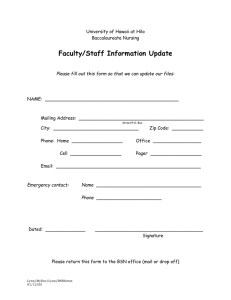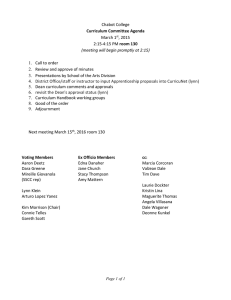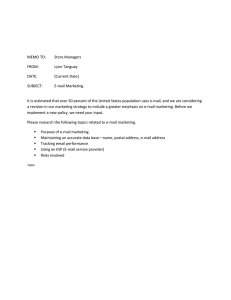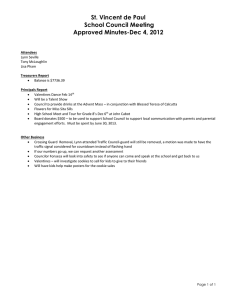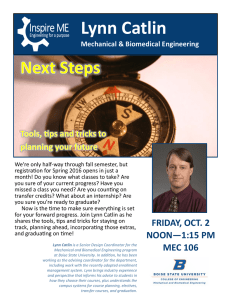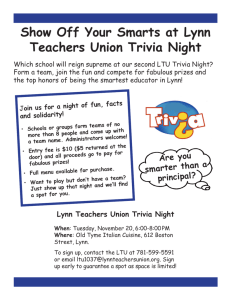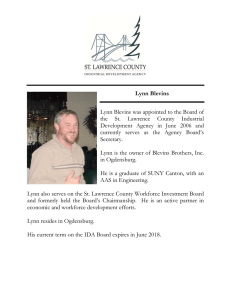Chapter One - Mindy McGinnis
advertisement
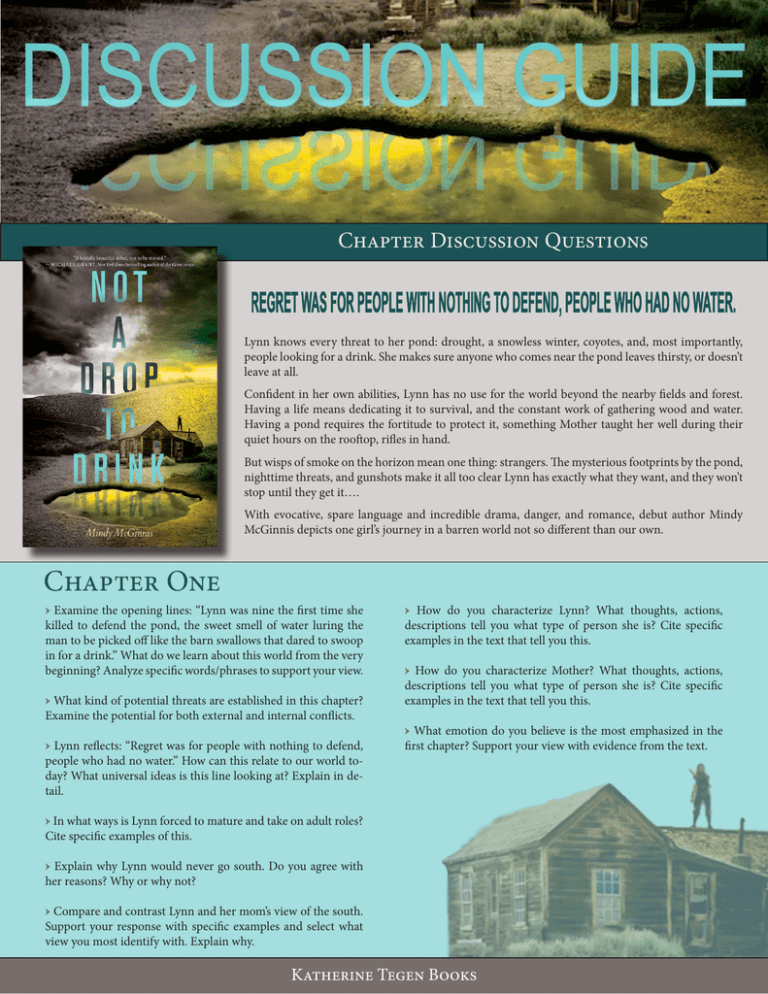
Chapter Discussion Questions Lynn knows every threat to her pond: drought, a snowless winter, coyotes, and, most importantly, people looking for a drink. She makes sure anyone who comes near the pond leaves thirsty, or doesn’t leave at all. Confident in her own abilities, Lynn has no use for the world beyond the nearby fields and forest. Having a life means dedicating it to survival, and the constant work of gathering wood and water. Having a pond requires the fortitude to protect it, something Mother taught her well during their quiet hours on the rooftop, rifles in hand. But wisps of smoke on the horizon mean one thing: strangers. The mysterious footprints by the pond, nighttime threats, and gunshots make it all too clear Lynn has exactly what they want, and they won’t stop until they get it…. With evocative, spare language and incredible drama, danger, and romance, debut author Mindy McGinnis depicts one girl’s journey in a barren world not so different than our own. Chapter One → Examine the opening lines: “Lynn was nine the first time she killed to defend the pond, the sweet smell of water luring the man to be picked off like the barn swallows that dared to swoop in for a drink.” What do we learn about this world from the very beginning? Analyze specific words/phrases to support your view. → What kind of potential threats are established in this chapter? Examine the potential for both external and internal conflicts. → Lynn reflects: “Regret was for people with nothing to defend, people who had no water.” How can this relate to our world today? What universal ideas is this line looking at? Explain in detail. → How do you characterize Lynn? What thoughts, actions, descriptions tell you what type of person she is? Cite specific examples in the text that tell you this. → How do you characterize Mother? What thoughts, actions, descriptions tell you what type of person she is? Cite specific examples in the text that tell you this. → What emotion do you believe is the most emphasized in the first chapter? Support your view with evidence from the text. → In what ways is Lynn forced to mature and take on adult roles? Cite specific examples of this. → Explain why Lynn would never go south. Do you agree with her reasons? Why or why not? → Compare and contrast Lynn and her mom’s view of the south. Support your response with specific examples and select what view you most identify with. Explain why. Katherine Tegen Books → What kind of relationship does Lynn have with Mother? Cite specific parts of the text to support your view. → How are Lynn and Mother like each other? How are they different? Cite specific examples to support your view. Chapter Two → Compare and contrast Lynn’s and Mother’s desires. How are they the same? How are they different? Cite specific examples to support your view. → Lynn’s mom states: “Things have changed… So we change with them.” What has changed for them? Do you believe they need to change? Why or why not? Support your answer with specifics from the text. → What indications do we see in this chapter that Lynn and her mom might be in danger? Chapter Three → Why does the young boy unnerve Lynn? Hypothesize possible reasons. → Mothers says: “I took the road less traveled by – and that has made all the difference.” Explain what she means by this. Cite support from the text to back up your view. Share a time when you followed this same belief. → What are the pros and cons of how Lynn and Mother live? Examine and explain both the negative and positive aspects by supporting with specific examples from the text. → Mother quotes a line from Robert Frost’s poem “The Road Not Taken.” Read the entire poem and explain how it relates to the text so far. Cite specific examples from both the poem and the book to support your view. Chapter Four → Mother quotes a poem by Coleridge and says: “Water water everywhere, but not a drop to drink.” Can you think of examples in our society where we may have something that there’s plenty of and we can’t use it for some reason? → Mother keeps her eye on the smoke to the south, presumably produced by the people who were not shot when they tried to sneak up on Lynn and Mother. Hypothesize what these people might be doing. → Lynn recalls the event from her youth with Stebbs. She remembers: “It was the first and only time Lynn could remember speaking to anyone other than Mother.” Why do you think Lynn and Mother never spoke to Stebbs before? Hypothesize by using specific examples from the text to support your view. Chapter Five → Lynn reflects on Mother’s reactions to men: “Men. Mother always spoke that word with such malevolence that Lynn could not imagine what they must be like. The dangers they posed to her survival she was aware of. Other threats, only hinted at by Mother, remained a mystery.” Mother is referencing rape, a threat that is alien to Lynn because she doesn’t even have a concept of sex. Why do you think Mother does not teach Lynn about sex or the dangers of it? What might be her motivation in concealing it? → Lynn often imagines fictitious lives: “She twisted her finger around the faucet, imagined how amazing it would be to turn it and hear the splash of water into the porcelain tub.” What are some of the things she has imagined throughout the book? Why do you think that is? Chapter Six → What is the mood of this chapter? Explain how the environment matches the mood by using specific examples from the text. → Lynn reflects: “Thanks to Mother, Lynn knew what poetic justice was.” What do you think she means by this? How does it relate to the novel? → “Fear drove her from the tomb of the basement.” Examine the word choice in this line and explain how it doesn’t just relate to what is going on in the basement at that moment but how it can relate to the text as a whole. → “Work without Hope draws nectar in a sieve, And Hope without an object cannot live.” Explain what Lynn means by this Samuel Taylor Coleridge quote. How does it relate to the novel? Explain, citing specific examples from the text to support your view. → What sort of things does Lynn do to deal with her grief? Explain in detail. Think about other novels or short stories you have read that feature grief. How did those characters handle it? It what ways is it the same as how Lynn deals with her grief? Katherine Tegen Books Chapter Ten → Hypothesize reasons why Neva might not allow Stebbs into the tent. → Why do you think Lynn decides to add “Asshole” to the end of her note to Stebbs? Chapter Seven → Lynn feels responsible for Mother’s death. Do you believe she is? Why or why not? → What are the potential dangers in the deal Lynn makes with Stebbs? What are the positives? → Lynn tells Neva: “You don’t have to hide it…Pain is nothing to be ashamed of.” Do you agree with this? Why or why not? Where do we see people/groups of people in the world who may have an opposite view as you? → Lynn quotes William Butler Yeats: “I balanced all, brought all to mind, The years to come seemed waste of breath, A waste of breath the years behind In balance with this life, this death.” How do these words relate to the novel? Explain using specific examples to support your view. Chapter Eight → Examine the way that Neva lost her husband. What does this say about the type of society they live in? Explain. → What season is it? How is this symbolic to the novel? Explain, citing specifics from the text. → How are men portrayed in this chapter? Examine the different ways the author presents them to us and explain each. → How is the environment used in this chapter to help foreshadow potential threats? Cite specific examples from the text. → Reflect back to the warning Mother gives Lynn early in the book: “Men. Mother always spoke that word with such malevolence that Lynn could not imagine what they must be like. The dangers they posed to her survival she was aware of. Other threats, only hinted at by Mother, remained a mystery.” How does the portrayal of some of the men in this chapter work to confirm Mother’s distrust of men? How does it dispute it? → In what ways is Lucy like Lynn? Support with specific examples. In what ways is she different from Lynn? Support with specific examples from the text. → How would you characterize Stebbs at this point? What type of person is he? Use specific examples from the text to support your view. → Do you trust Stebbs at this point? What indicators show that you could? What indictors show that you might not want to? → Stebbs tells Lynn: “I think we’re in danger of becoming friends.” Do you think this is true? Why or why not? → The chapter ends with the image of Lynn watching over Lucy from Mother’s cot: “Lynn fit into it nicely, and watched over Lucy while she slept.” How does this parallel images from earlier in the novel? Explain using specifics from the text. Chapter Nine → How has Lynn’s role shifted in the novel? Use specific examples to support your view. → What men in the book appear to be allies? Who appear to be threats? Explain why using specifics from the text. → How are men being portrayed differently as the novel moves forward? Support your answer with specifics from the text. → At this point in the novel, how is Lucy like Lynn? Describe and support citing specific examples. How is she different from Lynn? Describe and support citing specific examples. → Lynn reflects on the dead boy and Eli: “Lynn balanced the two faces in her mind, trying to tack down what exactly made them so different.” What do you think makes them different? Which do you think Lynn feels more connected to? Why? → What do you think it means that Lynn dreams about Eli? “For the first time since her death, Lynn dreamt of a face other than Mother’s.” Why is this important? What might this foreshadow? Katherine Tegen Books → What potential problems/conflicts are uncovered in this chapter? Hypothesize potential outcomes for each. → Lynn is angry with Stebbs for volunteering to help Eli and Neva, but also understands why he did what he did: “Stebbs seemed to think that the Streamers had become their responsibility and she wasn’t sure she disagreed. Their complete inability to care for themselves would leave them dead before winter. She and Stebbs had the chance to prevent that.” Do you believe people have the moral responsibility to care for people who can’t? Why or why not? How do we see examples of this in our society? → Examine the paragraph that begins: “Lucy woke to find her new protector sitting in the other cot with her arms crossed defensively…” The narration shifts into Lucy’s POV. Why do you think that is? What effect does it have on the book? Chapter Thirteen → Stebbs says: “But people are still the same… And all everyone is trying to do is survive.” Do you believe this is true to life? Why or why not? What other pieces of literature have you read that have similar themes. Describe these. → Stebbs comments: “Those poor bastards your mom blew away over the years? They was just trying to get a drink, to get by one more day.” Do you think Stebbs should feel empathy toward those who are trying to survive? Why or why not? → How are Lynn’s views on survival different from Stebbs’? Compare and contrast the way her and Stebbs each see and react to the idea of survival. Whose views do you think are the best? Why? → Examine the discussion that Lynn has with Lucy at the end of the chapter. What kind of shift do we see happening? What might this foreshadow? → In what ways does Lynn make comparisons between her life and Eli’s life? Chapter Eleven → Do you think it’s wise for Lynn to flirt back with Eli? Why or why not? What possible downfalls might it have? What positives? → “Self-reliance had been Mother’s mantra. Nothing was more important than themselves and their belongings.” What could be some positives to living like this? What could downfalls be? Do you agree with this type of living? Why or why not? → Neva doesn’t think Lynn understands her pain. She asks Lynn: “You don’t have any children, do you?” Do you believe you need to have children to connect to the type of pain that she’s feeling? Why or why not? → When Stebbs talks to Lynn about Neva, he says: “Women don’t always show their emotion clearly…” How have we seen this proven true in the book? Provide specific examples. → Look at the last two paragraphs of this chapter. What is your reaction to Lynn’s shift in thinking? Do you think it’s wise? Unwise? Explain your views. → Lynn acts in ways that are very unlike the person we saw her as in the beginning of the book when Mother was still alive. How do we see her changing? Are these positive changes or negative? Chapter Fourteen → As the stranger leaves, Lucy watches through the glass. “‘Good luck, Mister,’ she said, her words filled with the hope of a child.” Do you have hope for him? Why or why not? What about the other characters in the book? Evaluate each character (Lynn, Lucy, Stebbs, Eli and Neva) and explain whether or not you’re hopeful for each and why. Chapter Twelve → When Lucy follows Lynn’s instructions, Lynn feels proud that Lucy listens to her, but she then thinks: “It’s not like she’s yours or anything.” Do you think this is true? In what ways is Lucy Lynn’s? Explain → When talking about Lucy, Stebbs says that once Neva is well, Lucy should be with her mother. Do you agree that this is for the best? Why or why not? → Stebbs says that he helps Neva and Eli because: “…I haven’t always done the right thing in my past, and this seems a good way as any to make up for it.” Do you believe this is true? Can you make up for the wrongs that you’ve done in your past? Why or why not? → Lynn reflects on her father and wonders how much of his instability rubbed off on Mother. What do you think? Did she seem unstable? Support your view with specifics from the text. Katherine Tegen Books → In what ways do we see Neva struggling to be a mother? Cite specific examples - from this chapter or previous ones - of things that she can or can’t do to support your answer. → How is Lynn and Eli’s relationship shifting? Do you think this is a good thing or a bad thing? Explain. → Lynn also wonders how much of her father’s insanity has rubbed off on her. Do you believe any has? Why or why not? Support your view with specifics from the text. → Lynn says that she’d rather be at the pond where she knows how everything is than somewhere else that is unfamiliar. Do you agree with this? Is it better to be in an unpleasant place you know than to pursue the unknown, which may be better? → Stebbs tells Lynn: “I’ve known lots of people in my life, Lynn… There’s plenty of good seed sown by the bad.” Think of other pieces of literature you’ve read that proves this example true. Describe the specific characters and how they are good. Chapter Sixteen → Compare the backgrounds of Mother and Lynn’s father. Describe both in detail. Where do we see other love stories like this in the past literature you’ve read? Describe the connections in detail. → Stebbs regrets not helping to raise Lynn. He says: “I can’t help but think if I’d been around maybe you’d have some softer edges. Maybe you could’ve actually had a life, and not just survived if I’d been here. “ Do you agree that Lynn’s just survived? Or has she had a life? Support your view with specifics from the text. → Lynn quotes Byron to Stebbs: “Yet am I changed; though still enough the same / In strength to bear what time cannot abate, / And feed on bitter fruits without accusing Fate.” What does this quote mean? How does it relate to the book? Support using specific examples from the text. → Mother always used to say: “It is what it is.” Lynn says that it means you can’t change something: “Like the past. You can’t change the things you’ve done. It’s the here on out you’ve got control of.” Do you believe this is true? Why or why not? Can you think of examples from literature where characters have believed this is true or not true? Describe your examples in detail. Chapter Fifteen → When Eli and Lynn talk about Neva, Lynn tells Eli: “There is no shame in being scared.” Why is this ironic? Explain using specifics from the text. Do you believe this holds true in our society? Why or why not? → Lynn reveals that there are things she’s never experienced like ice cream and music. Consider the world she is living in now. What other things might she have missed out on? Is this a benefit or downfall? Explain. Are there any negative things she might have missed out on? → Lynn talks about the men and tells Eli: “They walked into my place and took something from me, and I let them. They’ll do it again and again, for as long as I have something they want. Leaving them alone guarantees my own destruction.” Do you believe this is true? Why or why not? Support with specifics from the text. → When Lynn spots the yellow glow over the trees, she thinks: “This light was unfamiliar and strange. Which meant it was dangerous.” Where else in the novel do we see Lynn encountering things that are unfamiliar and strange? Evaluate and describe whether they have turned out to be dangerous or good. → We learn about a number of threats in relation to Lucy. List them and then hypothesize other potential threats to Lucy and the rest of the group that they may not be prepared for. → Hypothesize who could be on the roof and why. Chapter Seventeen → Examine the decision Neva makes to commit suicide. Why did she do it? Did she have to, or was there another option? Explain using specifics from the text to support your view. → How is Green Hat a contradiction to the other men? Examine his actions and explain how they are different. Why might this be? Chapter Eighteen → Lynn blames herself for many things in the novel. What are some of them? Why do you think she carries around this blame? Is she at fault for any of these things? Why or why not? → Why do you think Lynn wants to kill the men from the south? Katherine Tegen Books → Do you believe killing someone in order to live is right? Why or why not? → Evaluate the plan that Lynn, Stebbs and Eli create. Is it a good one? Why or why not? What are some potential downfalls? → Do you think Lynn is warranted to kill these men? Why or why not? Chapter Ninteen → In what ways does Lynn have the advantage over the men from the south? How do they have the advantage? Predict what you think the outcome will be and support your view by referencing to the book. → Stebbs and Lynn talk a lot about how Eli, Lucy, Vera, and Neva aren’t used to the way they live. What life do you think would be better- life in the city or life in the country? Explain your view with specific examples. → Eli tells Lynn not to do anything stupid when she goes to spy on the men. She then comments: “It’s not stupid.” Do you agree? Why or why not? → Lynn reflects: “In the past, it had been easy to know who her enemies were – anyone not Mother.” Who are her enemies now? Do you believe she should trust everyone around her at the moment? Why or why not. Support by citing specific examples from the book. → How does Green Hat seem to show sides of both good and evil? Examine both sides and support with specific examples from the book. Chapter Twenty → When Stebbs talks to Lynn about her father, he says: “There ain’t ever been one person who was all good or all bad, not me or you, not your mom or your daddy either.” Evaluate both the good and the bad in the following characters: Lynn, Stebbs, Mother, Neva, Eli. → Think about antagonist characters in literature that you have read. Evaluate the good and bad in them. Examine a minimum of three characters. → Do you believe Stebb’s statement is true in our world? Why or why not? Is there anyone you can think of who does seem purely evil or good? Describe. → There are many points where Lynn defends why she’s killing people. For example, she says: “I’m not killing people for spite. This is about living.” Do you believe that is true? Why or why not? → Lynn cries because she knows that Mother would have never risked her own skin for the sake of others. Do you believe this is true? Why or why not? Support with specifics from the book. → What are your thoughts on risking your own life for someone else? Would you do that if the circumstance called for it? Why or why not. → Where have you seen examples of characters from literature that have risked their own lives for the life of others? Describe the character and situation that led them to that choice. Chapter Twenty-One → When Lynn shoots Eli, she reflects that it’s the only bullet she’s ever fired with love in her heart. What does she mean by this? What motivated the other bullets she fired? → Green Hat doesn’t harm Lynn and she leaves him alone. Discuss how Green Hat is different from the other men. Cite specific examples from the text to support your view. → Lynn’s father says: “Nothing’s nobody’s out here, little girl. Those that can, take. And there ain’t no justice or higher power to appeal to.” Discuss how Lynn did not follow that way of life. Cite specific examples from the text to support your responses. → Where have we seen this same attitude in history and our world today? Share specific examples. → Lynn’s father comments: “I don’t think your mother would approve of your soft ways.” Do you agree with this? Why or why not? Explain using details from the book. → Discuss the symbolism in Lynn burying Eli. Why is it important to her? Use specifics from the text to support your view. Epilogue → What is the world like now for Lynn and Lucy? Describe. Are you hopeful for their future? Why or why not? Support your view with specific details. Katherine Tegen Books → Why do you think Lynn decides not to have Lucy kill the coyote? Explain the significance of this decision. → How has Lynn changed as a character from the beginning to the end of the novel? What has caused her to change? Trace her transformation citing specifics from the text to support your views. Guide written by Rachele Alpine | http://www.rachelealpine.com Designed by Renee Combs | http://reneecombsdesigns.weebly.com Mindy McGinnis is an assistant YA librarian who lives in Ohio and cans her own food. She graduated from Otterbein University magna cum laude with a BA in English Literature and Religion. Mindy has a pond in her back yard but has never shot anyone, as her morals tend to cloud her vision. Katherine Tegen Books Water: The Epic Struggle for Wealth, Power, and Civilization by Steven Solomon Harper Perennial | ISBN-13: 978-0060548315 In Water, esteemed journalist Steven Solomon describes a terrifying—and all too real—world in which access to fresh water has replaced oil as the primary cause of global conflicts that increasingly emanate from drought-ridden, overpopulated areas of the world. Meticulously researched and undeniably prescient, Water is a stunningly clear-eyed action statement on what Robert F Kennedy, Jr. calls “the biggest environmental and political challenge of our time. Water Ethics: Foundational Readings for Students and Professionals by Dr. Peter G. Brown, ed. Island Press | ISBN-13: 978-1597265652 Having manipulated water for irrigation, energy, and burgeoning urban centers, humans are facing the reality that although fresh water is renewable, it is as finite as any other resource. Countries, states, and cities are now scrambling to develop an intelligent, well-informed approach to mitigate the growing global water crisis. Water Ethics is based on the belief that responding to contemporary water problems requires attending to questions of value and culture. How should we capture, store, and distribute water? At what cost? For whom? How do we reconcile water’s dual roles as a practical resource and spiritual symbol? According to the editors of this collection of foundational essays, questions surrounding water are inherently ethical. Peter Brown and Jeremy Schmidt contend that all approaches to managing water, no matter how grounded in empirical data, involve value judgments and cultural assumptions. Each of the six sections of the book discuses a different approach to thinking about the relationship between water and humanity, from utilitarianism to eco-feminism to religious beliefs, including Islam, Hinduism, and Christianity. Not A Drop to Drink: America’s Water Crisis by Ken Midkiff, Robert F. Kennedy, Jr. New World Library | ISBN-13: 9781930722682 In some parts of the United States, water is disappearing as consumption exceeds supply. In other parts, battles are raging that will determine both the cost and the quality of a simple glass of water. Not a Drop to Drink comprehensively examines the imminent crisis of America’s water supply and explains what readers everywhere can do about it. In this straightforward, story-driven book, Ken Midkiff talks to crusty ranchers in Topeka, suited lawyers in Atlanta, and smooth-talking politicians in Los Angeles and Washington, D.C. Using regional and national case studies, he analyzes and presents the roots of the problem, and then says what we must do to solve it. Written by one of the foremost experts on America’s water supply, Not a Drop to Drink is a must-read book for concerned citizens nationwide. Documentaries: • Water Wars (2009) This timely documentary uncovers critical water issues facing humanity. It takes the viewer from the floods and droughts in Bangladesh, to dam building in India, water management in the Netherlands and the latest wake-up call in America: the Katrina disaster and the drought in the Southwest. Future wars will be fought over access to fresh water, unless we come together to face this global crisis. Without water there is no life. http://www.imdb.com/title/tt1509836/ • Blue Gold: World Water Wars (2008) Wars of the future will be fought over water as they are over oil today, as the source of human survival enters the global marketplace and political arena. Corporate giants, private investors, and corrupt governments vie for control of our dwindling supply, prompting protests, lawsuits, and revolutions from citizens fighting for the right to survive. Past civilizations have collapsed from poor water management. Can the human race survive? http://www.imdb.com/title/tt1137439/ • Last Call at the Oasis (2012) This documentary presents a powerful argument for why the global water crisis will be the central issue facing our world this century. Illuminating the vital role water plays in our lives, exposing the defects in the current system and depicting communities already struggling with its ill-effects, the film features activist Erin Brockovich and such distinguished experts as Peter Gleick, Alex Prud’homme, Jay Famiglietti and Robert Glennon. http://www.lastcallattheoasis.com Online News Articles: • The Coming War for Water: http://www.globalpolicy.org/security-council/dark-side-of-natural-resources/water-in-conflict/48182.html • Will The Next War be Fought over Water: http://www.npr.org/templates/story/story.php?storyId=122195532 • Water Wars Worldwide: Database of News Articles regarding water exploitation country by country, and state by state in US. http://wearemichigan.com/WorldWaterWars/index.htm National Geographic Global Issues Series: Water Resources ISBN-13: 9780736297509 Addresses Common Core Standards on various reading levels Katherine Tegen Books
